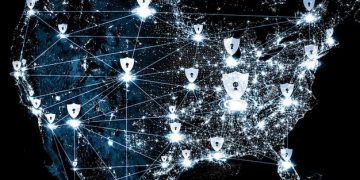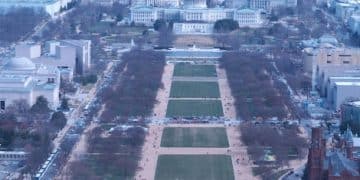Election Interference Probe: Latest Updates and Developments

Updated: The Latest Developments in the Investigation into Election Interference focus on ongoing inquiries into alleged foreign meddling, potential conspiracies, and their impacts on democratic processes in the United States, involving various government agencies and legal proceedings.
The investigation into election interference continues to be a critical area of focus, scrutinizing potential threats to the integrity of democratic processes. Updated: The Latest Developments in the Investigation into Election Interference reveals complex legal and political battles reshaping national security.
Understanding the Scope of Election Interference
Election interference refers to any attempt by domestic or foreign actors to influence the outcome of an election. These actions can encompass a wide range of activities, from hacking voter databases to spreading disinformation online. Understanding the multifaceted nature of these threats is crucial for preserving the integrity of democratic systems.
Defining Election Interference
Election interference can take many forms, posing significant challenges to the sanctity of elections. Some key aspects include:
- Hacking and cyberattacks targeting voter registration systems.
- Disinformation campaigns designed to mislead voters.
- Foreign governments funding or supporting political campaigns.
- Attempts to suppress voter turnout through intimidation tactics.
The complexity of election interference necessitates ongoing vigilance and comprehensive strategies to safeguard democratic processes.
The Role of Government Agencies
Several government agencies play a vital role in detecting and responding to election interference. These include:
- The Federal Bureau of Investigation (FBI), responsible for investigating federal crimes, including those related to election security.
- The Department of Homeland Security (DHS), tasked with protecting critical infrastructure, including election systems.
- The Cybersecurity and Infrastructure Security Agency (CISA), which works to enhance cybersecurity and resilience in election infrastructure.
Effective collaboration between these agencies is essential for a unified defense against election interference threats.
Ultimately, addressing the scope of election interference requires a coordinated effort by government agencies, civil society organizations, and the public to maintain trust in democratic institutions.

Key Investigations and Findings
Numerous investigations have been launched to uncover the extent and impact of election interference. These inquiries have provided critical insights into the methods used by adversaries and the vulnerabilities exploited. A closer look at these investigations reveals the ongoing efforts to protect electoral integrity.
The Mueller Report
Special Counsel Robert Mueller’s investigation into Russian interference in the 2016 presidential election produced a comprehensive report detailing numerous contacts between the Russian government and individuals associated with the Trump campaign. While the report did not establish a criminal conspiracy, it revealed substantial evidence of Russian efforts to interfere with the election.
The Mueller Report highlighted:
- Russian cyberattacks targeting the Democratic National Committee (DNC) and Hillary Clinton’s campaign.
- The use of social media to spread disinformation and sow discord among American voters.
- Contacts between Russian officials and Trump campaign associates.
This investigation underscored the need for enhanced vigilance and security measures to protect future elections.
Ongoing Congressional Inquiries
Congressional committees have also been actively investigating election interference, holding hearings and gathering information from relevant parties. These inquiries aim to provide oversight and develop legislative solutions to strengthen election security.
Areas of focus include:
- Assessing the vulnerability of voting machines and electronic systems.
- Examining the role of social media platforms in spreading disinformation.
- Evaluating the effectiveness of current laws and regulations in addressing election interference.
The outcomes of these congressional inquiries are crucial for informing policy decisions and bolstering election security measures.
In conclusion, key investigations such as the Mueller Report and ongoing congressional inquiries have shed light on the multifaceted challenges of election interference, driving the need for continued vigilance and proactive measures.
Legal and Political Battles
The issue of election interference has triggered intense legal and political battles, shaping the landscape of election security and democratic processes. These conflicts involve debates over legislation, legal challenges, and partisan disagreements.
Legislative Efforts to Enhance Election Security
Efforts to enhance election security have led to various legislative proposals aimed at addressing vulnerabilities and strengthening safeguards. These include:
- Legislation to modernize voting equipment and transition to paper ballots.
- Measures to improve cybersecurity protections for election systems.
- Campaign finance reforms to reduce the influence of foreign money in elections.
The passage and implementation of these legislative measures are critical for fortifying election integrity.
Partisan Divides and Political Challenges
The issue of election interference has often been plagued by partisan divides and political challenges. Disagreements over the extent and nature of the threat, as well as the appropriate response, have hindered progress and fueled political tensions.
Key divisions include:
- Differing views on the seriousness of foreign interference.
- Disagreements over the need for new regulations and oversight.
- Political polarization that impedes bipartisan cooperation.
Overcoming these political obstacles is essential for a unified approach to election security.

Ultimately, navigating the legal and political battles surrounding election interference requires a commitment to bipartisan cooperation and a shared focus on safeguarding democratic institutions.
The Impact on Public Trust
Election interference has profound implications for public trust in democratic processes. When citizens believe that elections are vulnerable to manipulation, confidence in the legitimacy of government can erode. Addressing these concerns is vital for maintaining a healthy democracy.
Erosion of Confidence in Elections
The perception of election interference can erode public confidence in the integrity of elections. Concerns about hacking, disinformation, and foreign influence can lead to doubts about the accuracy and fairness of electoral outcomes.
Factors contributing to this erosion include:
- High-profile reports of election interference activities.
- Widespread dissemination of false or misleading information.
- Lack of transparency in election processes.
Restoring and maintaining public trust requires proactive measures to address these concerns.
Strategies for Restoring Confidence
Several strategies can be employed to restore public confidence in elections. These include:
- Enhancing transparency in election processes and making information accessible to the public.
- Implementing robust security measures to prevent and detect election interference.
- Promoting media literacy and critical thinking to combat disinformation.
Building trust requires a concerted effort by government, civil society, and the media.
In conclusion, addressing the impact of election interference on public trust necessitates a commitment to transparency, security, and proactive communication to restore confidence in democratic processes.
Technological Challenges and Solutions
The digital age presents both challenges and opportunities in the fight against election interference. Technological advancements can be exploited by malicious actors to disrupt elections, but they also offer tools for detecting and countering these threats.
The Role of Social Media
Social media platforms have become a key battleground for election interference. These platforms can be used to spread disinformation, manipulate public opinion, and sow discord among voters. Addressing these challenges requires a multi-pronged approach.
Key issues include:
- The rapid spread of false or misleading information.
- The use of bot networks to amplify disinformation.
- The challenge of identifying and removing malicious content.
Effective solutions require collaboration between social media companies, government agencies, and civil society organizations.
Innovations in Election Security
Technological innovations offer promising solutions for enhancing election security. These include:
- Blockchain technology for secure and transparent voting systems.
- Artificial intelligence (AI) for detecting and countering disinformation campaigns.
- Advanced cybersecurity measures to protect voting machines and electronic systems.
These innovations have the potential to significantly improve the resilience and integrity of elections.
Ultimately, navigating the technological challenges of election interference requires a commitment to innovation, collaboration, and ongoing vigilance to safeguard democratic processes.
Looking Ahead: Future Directions
As election interference tactics evolve, it is crucial to look ahead and anticipate future threats. Developing proactive strategies and investing in long-term solutions are essential for maintaining the integrity of democratic processes.
Anticipating Emerging Threats
Emerging technologies and geopolitical dynamics pose new challenges to election security. Anticipating these threats requires ongoing research and analysis.
Potential future threats include:
- Deepfakes and synthetic media used to spread disinformation.
- Advanced cyberattacks targeting critical election infrastructure.
- The use of artificial intelligence to manipulate voter behavior.
Proactive planning and investment are key to mitigating these risks.
Strategies for Long-Term Resilience
Building long-term resilience to election interference requires a comprehensive and sustained effort. This includes:
- Investing in education and media literacy to empower citizens to critically evaluate information.
- Strengthening international cooperation to combat foreign interference.
- Enhancing legal and regulatory frameworks to deter and punish election interference activities.
A holistic approach is essential for preserving the integrity of democratic institutions.
In conclusion, looking ahead, addressing future challenges of election interference requires proactive anticipation, strategic planning, and a commitment to long-term resilience, safeguarding democratic values.
| Key Point | Brief Description |
|---|---|
| 🛡️ Scope of Interference | Includes hacking, disinformation, and foreign funding impacting fair elections. |
| 🕵️ Key Investigations | Mueller Report and Congressional inquiries reveal election vulnerabilities. |
| ⚖️ Legal Battles | Legislative efforts and partisan divides affect election security measures. |
| 🔒 Impact on Trust | Interference erodes public confidence; transparency is key to restoration. |
Frequently Asked Questions
▼
Election interference includes any actions taken to undermine the integrity of the electoral process, such as hacking voter databases, spreading disinformation, or illegal campaign financing.
▼
Social media platforms can be used to spread disinformation, manipulate public opinion, and sow discord among voters, becoming a key battleground for influencing elections.
▼
Restoring public trust in elections involves enhancing transparency, implementing robust security measures, and promoting media literacy to combat disinformation and foster confidence.
▼
Technological solutions include blockchain voting systems, AI-driven disinformation detection, and advanced cybersecurity to safeguard voting machines and electoral data from manipulation.
▼
Future threats include deepfakes, advanced cyberattacks on election infrastructure, and the use of AI to manipulate voter behavior, necessitating proactive planning and countermeasures.
Conclusion
In summary, the ongoing investigation into election interference highlights the complex and evolving challenges to democratic integrity. Addressing these threats requires a coordinated effort involving government agencies, technological innovations, and public awareness to protect electoral processes and uphold public trust.





